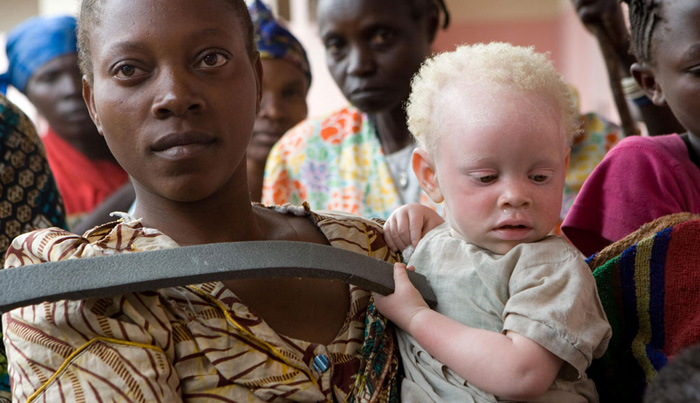“I AM desperate to save my child,” says Martha Phiri, looking at her nine-year-old daughter Esther. The child, who has albinism, scribbles away in a book, oblivious to her mother’s concerns. People with the genetic disorder, which is characterised by an absence of pigment in the skin, hair and eyes, have long suffered from discrimination in Malawi, where superstition about the condition runs deep.
But in the past two years taunts have turned into deadly attacks. On May 23rd, 38-year-old Fletcher Masina became at least the 18th person with albinism to be murdered in Malawi since the end of 2014 (others have disappeared and probably been killed). The killings are barbaric. Bodies are abandoned with limbs cut off and organs ripped out. More than 60 related cases have been recorded. These range from murders to the theft of bones from the graves of people with albinism. Attacks are driven by the belief that albino body parts can be used in witchcraft to bring wealth and cure disease. The UN warns that Malawi’s estimated 10,000 albinos face “extinction” if the killings continue.
A relatively peaceful country, Malawi has never seen such violence before. It is Malawi’s neighbour Tanzania that had previously been associated with attacks on albinos. But the Tanzanian government has in recent years done something about it. It has arrested unlicensed traditional healers and imposed stiffer penalties on “albino hunters” and those who trade in body parts. Thanks to the crackdown and to a campaign by a Canadian charity to teach Tanzanians that their albino neighbours have no magic powers, attacks against Tanzanian albinos have fallen. The government has registered people with the condition, so that it can monitor and track them, and has established safe houses for children at risk of attack.
The Malawian government suggests that foreign witchdoctors from Tanzania and elsewhere are behind the attacks on its soil. In Malawi people with albinism are not monitored, crimes go uninvestigated and penalties are mild. It is typically not the witchdoctors themselves who abduct and kill. More commonly, it is locals who are swayed by promises of large sums of money. In many cases relatives are involved. “Some parents or relatives don’t really value a child with albinism. They get tempted by the offer of money,” says Bonface Massah, head of the Association of People with Albinism in Malawi.
As for the source of demand for albino body parts, speculation abounds. Dr Mary Shawa of the Ministry of Gender, Disability and Social Welfare in Malawi denies that there is a market and insists that the murderers are opportunists acting on rumours of payments. But there is plenty of evidence to suggest that there is indeed an organised trade: many of those arrested in Malawi in possession of bones have said they were to be sold to buyers in neighbouring countries.
People with albinism, for their part, live in fear. Many do not go out at night and are wary about whom they meet. In January two women offered Ms Phiri 1m kwacha ($1,450) for Esther so they could extract the gold they believed was in her bones. Esther now rarely leaves the house.
“I’m scared. What if I’m next?” says Clement Gweza, 24, a teacher living in a remote village in Dedza district, where two of the murders have taken place. “I can’t live like I used to.”
In a new report Amnesty International, a human-rights group, says the Malawian government has failed to protect albinos. It criticises the government for, among other things, not trying hard to investigate why Malawi has seen a rise in attacks or to work out where demand is coming from. Peter Mutharika, Malawi’s president, says he is “ashamed” by the attacks; but he seems to have done little about them.
Thanks to corruption, public funds do not go as far as they should. In 2013 the country’s main donors—who provided more than a third of government spending—stopped writing cheques after they found that officials had been looting the treasury. Meanwhile incompetent police investigations and lenient sentences do very little to deter continued attacks. In 2015 a man was fined 20,000 kwacha, or $29, for possessing human bones. Police assumed he had dug up a grave, rather than investigating a potential murder.
There has yet to be a murder conviction for any of the killings, most of which remain unsolved. “We are talking about 18 lives lost,” says Mr Massah. “That is tragic for a small country. How much longer must we wait for help?”







Comments